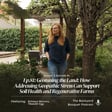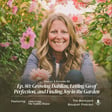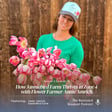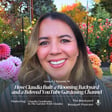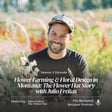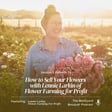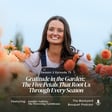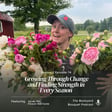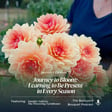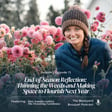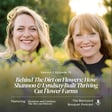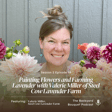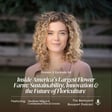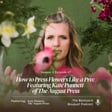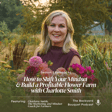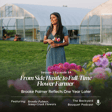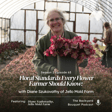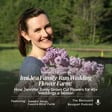
Ep.37 Building a Thriving Cut Flower Business With Katy King of Hidden Springs Flowers
In this episode of the Backyard Bouquet Podcast, we are joined by Katy King, of Hidden Springs Flowers in central Pennsylvania. Katy shares the inspiring journey of transforming a century-old family farm into a thriving cut flower business. She and her husband Jim started Hidden Springs in 2018, turning a simple backyard veggie patch into two acres of stunning seasonal cut flowers. Katy discusses the challenges and joys of balancing her roles as a farmer, entrepreneur, educator, and mother.
Tune in to learn about the farm's history, dating back to Jim's great-grandparents, and how Katy's passion for gardening and business led her to flower farming. She details the evolution of their business model, from selling to florists to focusing on retail and subscription bouquets. Katy also shares insights into her planting schedule, the importance of making the business fit around her life, and her strategies for managing the farm with minimal help.
Additionally, Katy talks about her passion for educating others in the floral industry, particularly on the business side of flower farming. She offers tips on using social media effectively and discusses her online course designed to help aspiring flower farmers.
Listen now to hear the full conversation and gain valuable insights from Katy King's journey with Hidden Springs Flowers.
In This Episode You’ll Hear About:
00:03:36 - History of Hidden Springs Flower Farm
00:05:23 - Transition from Vegetable Farming to Flower Farming
00:09:58 - First Flower Sales and Pop-Up Markets
00:19:44 - Adjusting Business Model for Family Life
00:29:53 - Current Flower Varieties Grown
00:31:05 - Year-Round Business Operations
00:32:31 - Selling Subscriptions During Holidays
00:34:15 - Starting Flowers from Plugs
00:40:03 - Passion for Educating Others
00:43:02 - Using TikTok for Business
00:45:58 - Importance of Storytelling in Business
00:46:36 - Online Flower Farm Course: In The Weeds
Learn More About Hidden Springs Flowers:
- In The Weeds Flower Farm Course: https://hiddenspringsflowers.com/pages/in-the-weeds
- Website: https://hiddenspringsflowers.com/
- IG: https://www.instagram.com/hiddenspringsflowers/
- FB: https://www.facebook.com/hiddenspringsflowers
- TikTok: https://www.tiktok.com/@hiddenspringsflowers
******
Show notes: https://thefloweringfarmhouse.com/2024/09/10/ep-37-hidden-springs-flowers/
Sign up for our newsletter: https://bit.ly/thefloweringfarmhousenewsletter
***Rate, Review, & Follow The Backyard Bouquet***
If you enjoyed this episode, will you please consider leaving the podcast a review?
New episodes every week to help keep your garden blooming!
